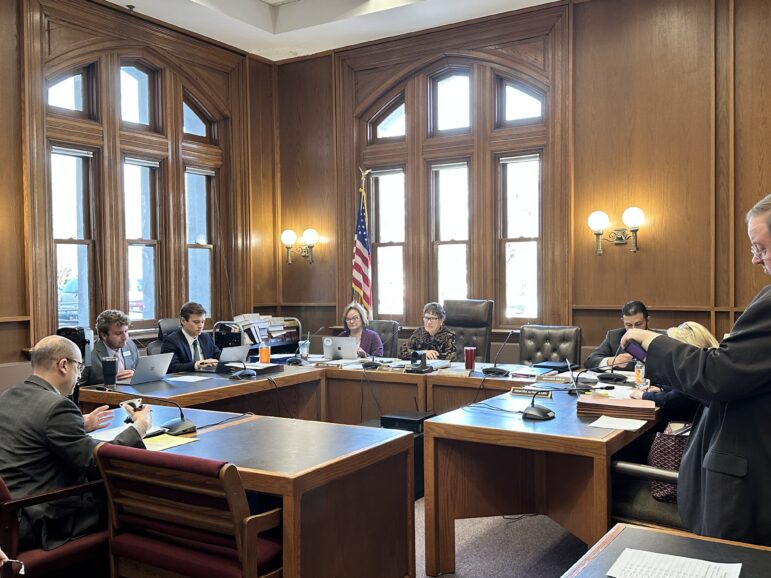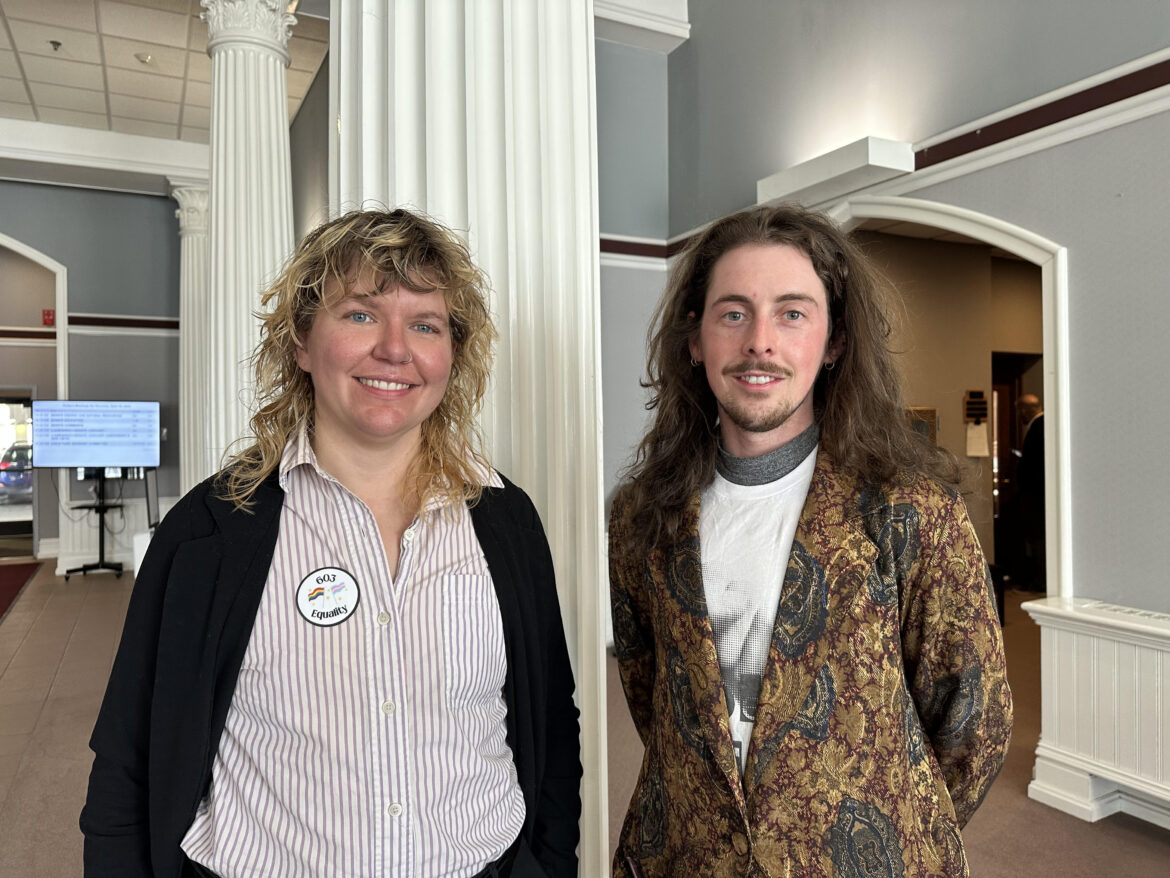
Above, the Senate Education committee is pictured Thursday meeting in Concord. Katharine Webster photo
By KATHARINE WEBSTER, InDepthNH.org
In sometimes emotional testimony, parents of school children spoke Thursday at a Senate Education Committee hearing for and against House Bill 324, which would ban “obscene,” “harmful” and “age-inappropriate” materials from schools and school libraries.
Katie DeAngelis, a mother from Nottingham with two children in public school, began crying as she recounted how books dealing with sexual abuse helped her begin to understand her own experience of sexual assault by a family member when she was six years old.
“I was able to begin processing what had happened to me through reading, and a lot of the books that I read were books that would be categorized as obscene or harmful under this bill,” DeAngelis said.
“These books didn’t glorify obscenity; they didn’t corrupt me or harm me,” she said. “They gave me language for experiences that I couldn’t talk about yet. They offered healing. Without them, I honestly don’t know how I would have coped.”
The books she named included “The Perks of Being a Wallflower,” by Stephen Chbosky, a frequent target of book ban attempts. The book’s main character struggles with mental health problems caused by past trauma, including sexual abuse by his aunt.
It was also the book from which Rep. Glenn Cordelli, R-Tuftonboro, the chief sponsor of HB 324, read aloud at the beginning of the hearing to illustrate the “obscene” and pornographic books that children have access to through their school libraries.
“If people think this crap is culture, then we’re in bad trouble in New Hampshire,” Cordelli said, after reading a scene of sexual assault.
Currently, educational institutions are exempt from the state’s law on obscenity, although another state law prohibits any adult from giving harmful materials to minors.
HB 324 would end the obscenity law exemption for K-12 schools, potentially subjecting educators to criminal prosecution. HB 324 also includes a broader definition of “obscenity” than current state law, to include depictions of nudity and sexual arousal, not just certain sexual acts.
It lays out a process and timelines for parents to object to books and other materials available via school libraries, including through a popular ebook and audiobook app. Parents who disagree with a decision made by the school principal could appeal to the superintendent, their local school board and finally the state Board of Education. The bill would set civil penalties of up to $1,000 per violation.
Sen. Debra Altschiller, D-Stratham, who sponsored a competing, unsuccessful bill that laid out a school library materials challenge process but did not include the other provisions, asked Cordelli if he had read all of “The Perks of Being a Wallflower,” an award-winning book, or just read a graphic scene out of context “and tried to make it salacious.”
Cordelli said that he had not read the whole book.
“Are you aware that that particular book deals with situations that are absolutely universal to the high school experience?” Altschiller asked, referring to sexual assault statistics that found one in three female victims of rape and attempted rape reported being assaulted for the first time between the ages of 11 and 17.
However, others testified that some sexual assault victims can be “triggered” by such content, including Sen. Victoria Sullivan, R-Manchester, the committee’s vice chair, who said that when she read similar passages aloud on the House floor last year, several representatives told her afterwards that it had been traumatic for them because they had experienced sexual assault.
And several parents said the bill was necessary because the local process for challenging obscene and harmful books did not work.
Kevin Gagnon, who identified himself as a widowed father from Salem, said that after he sought to get a book removed from his son’s school library, the local school district and school board decided it should remain. He pulled his son out of public school and put him in a charter school, he said.
“I feel sorry for people getting emotional here today,” he said. “But this has nothing to do with banning books; it has everything to do with keeping immoral, sexually explicit materials out of the schools.”
Two other parents testified that their school districts had dealt with their requests to remove pornographic books by barring their children from the school library, in one case, and by removing the books “due to low circulation,” rather than because they were harmful to children, in the other.
However, other people testified that the bill constituted legislative overreach in the way it defines obscenity and community standards.
Gilles Bissonnette, legal director for the American Civil Liberties Union of New Hampshire, said that while his organization has no objection to a process for challenging school library materials, HB 324’s definition of obscenity is unconstitutionally broad. He also recommended that legislators remove the appeal to the state Board of Education, because the “community standards” referred to in obscenity laws are better represented by local school boards.
Barrett Christina, executive director of the New Hampshire School Boards Association, was blunter. He said he did a Google search for sexual descriptions and references to sexual acts in Shakespeare’s plays and found numerous examples.
House Bill 324 “could be read overly broadly to ban any number of literary works,” he said.
The bill exempts works of “serious” literary, artistic or scientific value. However, the problem is that the idea of serious literary value is subjective, several opponents testified.
“Students have a First Amendment right to access a wide variety of materials in their school library,” said Deb Howes, president of the American Federation of Teachers-New Hampshire. “That’s where this bill falls down.”
Also, the bill’s definition of what is “harmful to minors does not require that a book be considered in its entirety by a committee in the community,” she said. “There could be upsetting things in any book. … That is not a fair representation of the value of the whole book.”
Linds Jakows, co-founder of 603 Equality, an organization founded to fight legislation that discriminates against LGBTQ people, said polling commissioned by the national nonprofit EveryLibrary and Moms Rising found that 56 percent of New Hampshire residents want decisions about school libraries to be made locally, while only 33 percent think the state should make those decisions.
603 Equality member Bellamy Ridinger also said it went against educational values to “wash the palette clean” for students under 18 and then expect them to understand the world when they become adults.
“Book bans are often aimed at the LGBT community and LGBT kids,” he said. “I think it’s the duty of our legislators … to serve the most vulnerable in our community.”
But Rep. Kristin Noble, R-Bedford, said she had found many materials that were simply age inappropriate in middle and high school libraries, including the graphic book “Let’s Talk About It: The Teen’s Guide to Sex, Relationships and Being a Human,” which she said defines and describes acts including “golden showers.”
“Children don’t need to see themselves having oral sex, taking part in a threesome,” she said. “I don’t understand when we decided we were going to stop protecting the innocence of minors.”
.





